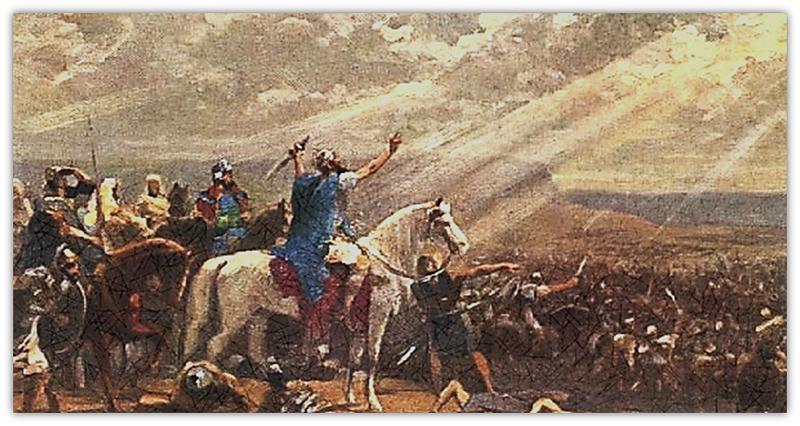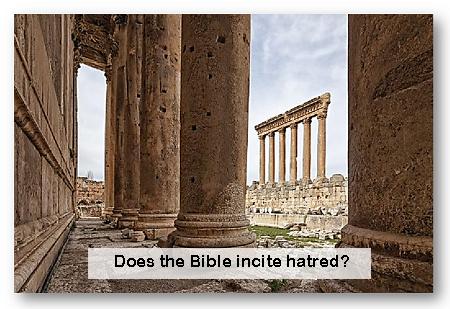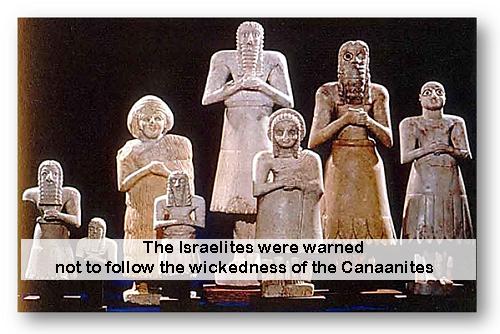Deuteronomy 7 - Show Them No Mercy
Deuteronomy 7 - Show Them No Mercy

Part 1⤒🔗
Our world is full of violence. On any day, you might follow the news, and there it is: robbery, murder, acts of war or terrorism. We should not be surprised when the Bible, too, confronts us with violence. But there is one thing that raises serious questions for us: sometimes God Himself instigates this violence. How could a God of love command that entire nations be wiped out?
My dissertation deals with the Lord’s command to Israel to destroy completely the peoples of Canaan.1 In this two-part article I will discuss the conclusions of my investigation. In particular, I want to examine the implications of this command for our view of God (part 1); further, I will address the question whether these texts do not give rise to violent acts in the present, and how Christians today are supposed to deal with these Scripture passages (part 2).
Content←↰⤒🔗
We find the most comprehensive and confronting expression of the command to exterminate the Canaanites in Deuteronomy 7. When Israel enters the Promised Land, it must destroy completely all the nations that live there. Israel may make no treaties with them, and may show them no mercy or compassion. They may not intermarry with them. Moreover, every reminder of the religious practices of these peoples is to be destroyed also. These commands, however, apply only to the inhabitants of Canaan. Other nations Israel must leave in peace; they must have friendly relations with them. The reason for this command is to be found in the special position of Israel as the Lord’s people. Israel belongs to Him. If the Canaanite nations remained, they would draw Israel away with them to worship their idols, and they would turn their backs to the Lord. In other places of the Old Testament, another reason for this command is given: the sins of the Canaanite peoples.
Israel must keep far from these sins: they must live by the commands of God. Then the Lord would bless them abundantly. Deuteronomy 7 especially elaborates on the Lord’s love for Israel, and on the rich blessings He promises when His people serve Him. On the other hand, if Israel should take over the practices of the Canaanites, the same judgement would strike them as well.
In later years, Israel does indeed follow the sins of these nations, and even outdoes them in wickedness. In the end this leads to judgement: the Babylonian exile.
Problem←↰⤒🔗
This command to destroy the nations raises penetrating questions. Throughout history, the Old Testament has been challenged and rejected because of them. In the 2nd century AD, Marcion contrasted the God of the Old Testament and the God of the New, in part because of the violence that the God of the Old Testament required. In Marcion’s view, this could not be reconciled with Christ’s command to love one’s enemies. And in our own time, the well-known British atheist Richard Dawkins has characterised the God of the Old Testament as a ‘bloodthirsty ethnic cleanser’. We, Westerners at the beginning of the 21st century, are quite sensitive to violence. The history of the 20th century has been marked by an eruption of violence; millions of human lives have been lost. Especially since September 11, 2001, religion has often been associated with acts of violence. The mass shooting of 77 people by Anders Breivik, the Norwegian terrorist, has strengthened this association. Somehow, Breivik imagined a link between Christianity and his personal ideology of merciless violence. Through these and other events, ‘religion as a motivation for violence’ has become a hotly debated topic.
These observations provide us with no resolution for our difficulties with the command of God to destroy the Canaanites. It is important, however, to remain aware of our cultural context, since it does influence the way we read the Bible.

God’s command to wipe out the Canaanite peoples raises huge questions for us. How could God Himself command such violence? Violence so radical that entire nations must be wiped out, utterly and indiscriminately? The Canaanite people had done nothing to Israel. They were given no opportunity to surrender or repent, it seems. Why? It is not just those who reject the Old Testament who ask these questions. It is especially when we do regard the Old Testament as the Word of God that such questions arise.
Why should the Canaanites have to be completely destroyed, and why should Israel, which is in no way better or more worthy, be chosen as the people of God? How could God Himself give the command for something as dreadful as genocide? How does that fit with His revelation in the Lord Jesus Christ, the One who came to seek and save the lost? For so many readers of the Bible today, such questions are as large as life.
Our View of God←↰⤒🔗
What are the implications of this command to destroy the Canaanites for the Old Testament’s portrayal of God? In Deuteronomy 7, God’s command to wipe out the Canaanite nations is closely linked to the nature and acts of God Himself. He is the One who issues this command, and He is actively involved in its execution. After all, the Lord Himself has given these people into the hands of Israel. Later, when the Old Testament looks back at this (partial) destruction, it explicitly points out that the Lord Himself has destroyed these peoples. At the same time, this very chapter speaks at length about God’s love and faithfulness for His people. When we think about the portrayal of God that Deuteronomy 7 presents, two aspects are important.
In the first place, this command to wipe out the Canaanites was given in a unique situation. Israel was called to do this only once, and with a view to one specific situation, and for a limited period of time. This extermination of the Canaanites is exclusively linked to the settlement of Israel in the land of Canaan.
Nowhere in the Old Testament is such a command ever grounded in the fact that people live in the land given to Israel. Nowhere do we read of a hatred of strangers per se. In Deuteronomy 7, it is the unique and exclusive relationship between the Lord and Israel that is at stake, and with it the fulfilment of God’s promises. At the same time, we hear of the judgement of God upon the sin of the Canaanite peoples. For a long time the Lord had been patient: now the measure of their sin was full (Genesis 15:16). In the second place, this command to destroy the Canaanites is a part of the way the Lord followed in the Old Testament. In this command, aspects of God’s self-revelation in the Old and New Testaments come to the fore, in particular His holiness and His abhorrence of sin. In both the Old and the New Testaments God’s love and His wrath belong together. The Lord is merciful and gracious, and He punishes sin (See Exodus 34:6-7). The New Testament too speaks of the judgement of God. God’s wrath can lead to terrifying judgements, such as the Great Flood, or the destruction of Sodom. In them we see something of the coming final judgement.
This judgement of God is dreadful, but it is not capricious or arbitrary. His judgement over the Canaanite peoples is almost always motivated by a reference to their wickedness. More than that, the same judgements will also come upon God’s own people, the Israelites, if they should follow the ways of the Canaanites. It is important to see the framework the Old Testament provides for these judgements, and to have regard for these texts within the history of salvation. As a Christian theologian, I can only have something to say about this command of destruction if I read it together with the message of the New Testament: that God in his Son has taken this judgement against sin upon Himself. The judgement of God and His grace are brought together at Golgotha. God has laid the judgement upon His own Son, who knew no sin. This is how God showed His love for people who had fully deserved this judgement. This is the only way that you can see who God is, in His judgement and in His compassion.

Part 2←⤒🔗
Discussions about violence in the media will sometimes turn to the Old Testament. “The Bible too incites hatred”, people will say, pointing to God’s command to wipe out the Canaanite peoples. May people draw on such passages from the Old Testament, to justify violence in the present time? And how do you, as a Christian, deal with such a terrible command?
Does this command to wipe out the Canaanites excuse acts of wholesale violence? This accusation is often heard. The philosopher Paul Cliteur is one such accuser. He claims that monotheistic religions are by definition intolerant.2 In his view, the Old Testament also contains numerous utterances that lend legitimacy to acts of violence.
A Call to Violence?←↰⤒🔗
The charge that the Bible lends support to acts of violence is understandable. For sadly, it is true that throughout history people have justified their oppression or destruction of other peoples by appealing to this command. We think of the extermination of native peoples in North America and the oppression of the black population in South Africa. The fact that we reject such appeals to Scripture does not negate the fact that they have occurred.
At the same time, the conclusion cannot be upheld that Deuteronomy 7 and similar passages justify the use of violence. After all, the Christian church and Christian theology do not read these passages in isolation. They have regard for their canonical and redemptive-historical context.
There are four reasons why attempts to justify violence on the basis of this command to destroy the Canaanites are entirely illegitimate:
-
First, the Old Testament command to wipe out the Canaanite peoples was restricted to the time of the occupation of Canaan. It was not repeated once the people of Israel had settled in the land. It is true that the Israelites were continually warned not to follow the wickedness of the Canaanites, but these warnings were not again linked to a command to destroy them. In the course of time, the Canaanites were gradually absorbed into the people of Israel.
-
Second, this command to destroy is confined exclusively to the Canaanite nations. The attitude Israel must take in relation to other nations is quite different. Israel may not destroy these neighbouring peoples, and their territories are to be respected. Strangers are to be treated with kindness. From all this it is clear that the Canaanites were very much an exception.
-
Third, the position of Gentile nations has undergone a radical change in the New Testament. The message of God’s salvation now goes out to all nations; now, Gentiles too come to share fully in this salvation. In the New Testament, the judgement of God no longer strikes specific nations that are punished as a whole. This alone shows that the command to destroy any nation can no longer be applied to our time.
- Fourth, the New Testament teaches much more clearly than the Old that the judgements of God and their execution are to be left in the hands of God. Moreover, God´s great judgement is postponed to the final judgement. While in the Old Testament, the people of God were called upon to use violence, this no longer happens in the New Testament. The warfare Christians are called to is a spiritual warfare, and it is fought with a spiritual armoury. The Kingdom of God cannot be realized by means of human violence.
These considerations lead to the conclusion that any appeals to this command to wipe out the Canaanites in order to justify acts of violence in the present are to be utterly rejected. Since the death and resurrection of Jesus Christ, it is impossible that the people of God might, at any time in history, be called upon to put other peoples to death.
No ‘Solution’←↰⤒🔗
I would like to address one more question: How are we, as Christians, to deal with this command of God to wipe out the Canaanite peoples? I cannot dismiss this command as a wrong human interpretation, as has often been suggested. For then it would not have come from God: it would have been an unjustified human conclusion. This command is too closely bound up with the revelation of God in the entire Old and New Testaments for that to be true. True, this command was never repeated, but nowhere is there a denial that it was once actually expressed. Nor does the New Testament ever in any way condemn this destruction of the Canaanites.

Besides, the Lord Jesus Himself often speaks about the judgement of God, and of eternal condemnation. In this specific situation, in this phase of the history of salvation, the utter destruction of the Canaanite peoples was apparently the will of God.
I read the command of God to wipe out the Canaanites as a part of the way that God has gone in history. It shows that God, in His holy wrath, can come with an all-destroying judgement upon wickedness. But that can never be separated from His love and mercy. The way of God in history is inseparably joined to His election, and to His judgements over His own people and His own Son.
The fact remains: this is a dreadful command. I cannot fully understand why, in that context, this was evidently the will of God. Why God wanted one nation to be wiped out, and why He chose another, a nation that was no better, a nation that God more than once came to the point of destroying. Clearly, God’s own people deserved the same judgement, but it was saved nonetheless. The only explanation given for this is God’s sovereign and inexplicable love (Deuteronomy 7:7-8).
Still, it is beyond our understanding that God, who reveals Himself as the God of love and compassion, can issue a command to exterminate whole peoples, apparently indiscriminately, without warning, and without possibility of salvation. Even when we weigh the reasons for this judgement provided in the Old Testament, it is still beyond our understanding why this consequence should follow. For that, I have no ‘solution’ that would answer our questions.
Moving On←↰⤒🔗
I do, however, understand why it is beyond my understanding. For with the coming of Jesus Christ, the relationship between Israel and the nations changed decisively; the option of violence for the people of God has changed also. From our situation after the coming of Christ, we cannot return to the situation before His coming. We cannot go back behind this progress in the history of salvation, either to explain why God gave this command in this situation, or to make a judgement concerning this command.
Our own cultural situation is also different, especially in the way we experience acts of violence. The affective distance and resistance we feel when we read Deuteronomy 7 is also there when we think of all the violence that has been committed in the name of God throughout history: the religious wars, the killing of heretics and witches, and so much more.
I cannot fully comprehend or explain the command of God to wipe out the Canaanite peoples: the history of salvation has progressed, and we live in a greatly different cultural context.
Taking into account the message of the Old and New Testaments as a whole, I cannot deny that this command, in this unique situation, was the expressed will of God. I read Deuteronomy 7 as one part of the way that God has gone in history. The history of the judgement and the grace of God leads to the coming of His Son Jesus Christ. As the great Substitute, He placed Himself under the judgement of God. In Him, the love of God was revealed in all its fullness. For this reason, and for this reason alone, I can love the God who reveals Himself in His word, and entrust myself completely to Him.

Add new comment